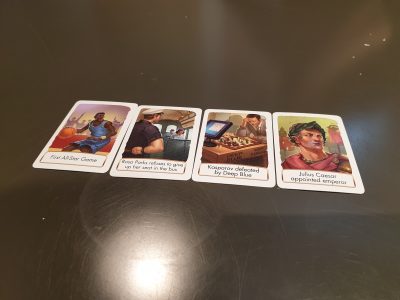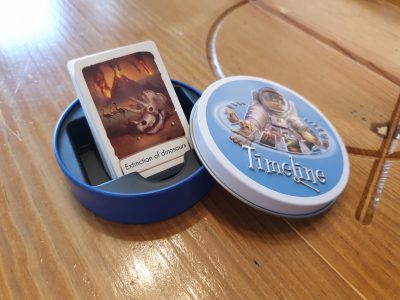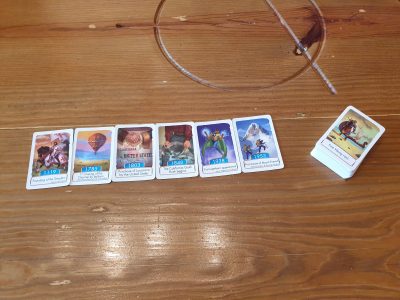Timeline Events, originally released back in 2011, is a card based, family friendly, trivia game. Designed by Frédéric Henry, featuring artwork from Jérémie Fleury and Gaël Lannurien, the game sees 2 – 8 players form a Timeline of cards – with players using knowledge or guesstimations. Playing takes on 10 – 20 minutes, with events such as the Trojan War and the construction of the first skyscraper in the deck. However, is playing Timeline Events fun or more of a non-event? Let’s find out!
To start off shuffle the deck, and deal each player 4 cards – making sure to keep the side with the year facedown. These cards are left on the table in front of the players, as this stops other players seeing the year values on the reverse. A starting card is then flipped from the top of the deck, turned to the year side. Placed in the centre of the table, this reveals a starting event time – with the game then ready to play.
Starting with the youngest player, or randomly, the first player chooses one of their cards. They must then place it to the left or right of the starting card. To see if they were correct they flip the card over to reveal the year. If the year of the played card is to the left it needs to be prior in history, with the right later in history. Note, if the year is the same it can be either side of a matching year card. Correct answers see play simply move on clockwise to the next player, with the card left in the timeline. Incorrect answers are discarded from the timeline and the player must draw an new card from the deck.
The next player then has the choice of left of one card, in the middle of the two cards or to the right. Going in the middle therefore meaning it is later in history than the card to the left but earlier than the card on the right of it. This continues with the timeline growing throughout the game, with each player adding a card at a time to the central line.
When any player plays their final card from their hand, the current round is the final one – so each player gets the same number of turns. If only one player has got rid of their cards then they are the winner. Ties are split by a sudden death mode. The tied players draw a new card, with players knocked out if they get it wrong. The winner is then the last player standing.
History is the central backbone to Timeline Events, with an educational vibe running throughout. Nevertheless, this isn’t boring classroom style learning with plenty of room for educated guesses and looks of concern from others when you don’t know the year of something they deemed important. It’s a fun twist on trivia and knowledge, with the constraints of it being between other years already on the table lessening the pressure on players – as you don’t need to know the exact year something occurred. For example, all you need to know is that first FIFA world cup (1930) happened before the first appearance of superheroes (1938).
There is replayability but not to the extent that can see Timeline Events being played forever, at least not on its own. With only a few players it isn’t more than a handful of games before you’ve gone through the deck. Whilst not a one and done situation, as it is still easy to muddle and forget dates, once cards start to come up for a second time in a session the game does falter. At this point the game gets packed away, ready to come out another time but not instantaneously. Give it a week and the exact years of events, such as the United States’ declaration of independence or the first voyage around the world, will have waned from most memories.
Timeline Events is unbelievably portable. The game is so small that is will be smaller than most peoples’ wallet or purse, comfortably fitting in a pocket. For those eager to take a game to the pub or for during a meal out, the size of the game, alongside the game length, make the title stand out. My only concern is that due to the game being designed to combine perfectly with other Timeline titles, the concept of grabbing just one set would go out of the window. This is a longer term issue as with only one set it is ideal, but once mixed with another set I can see it becoming an odd problem. It is almost as if two great aspects of the game are fighting against each other.
To fit into the small tin the cards are certainly on the petite side. It doesn’t really impact the gameplay at all, with cards not held in any way. It does make dealing and shuffling the deck a little awkward though. The artwork on the cards is decent and consistent, despite the different time periods – so there aren’t additional clues other than the imagery and event itself. One slight niggle is that the reverse of the cards only have the date written one way up. This can be a readability issue for those that struggle to read upside down if playing around a table, and something that perhaps bigger cards could have more easily accommodated.
Timeline Events presents a small package history trivia game with a difference. It’s lighthearted unpressured trivia that will become easier each time the game is played. Being made up of 55 cards it won’t stay at the table for a long period of time each outing, but it isn’t the sort of game that aims for hours of continuous play. It’ll comfortably fill 20 minutes each time and at that length the game is enjoyable. Timeline Events is like an entry to the series that’ll make you want more, showing the design is good, but as a standalone product is slightly lacking.
[Editor’s Note: Timeline Events was provided to us by Asmodee for review purposes. The game is currently available on 365 Games for £11.49. It is also available from local UK board game stores, find your local store here]




